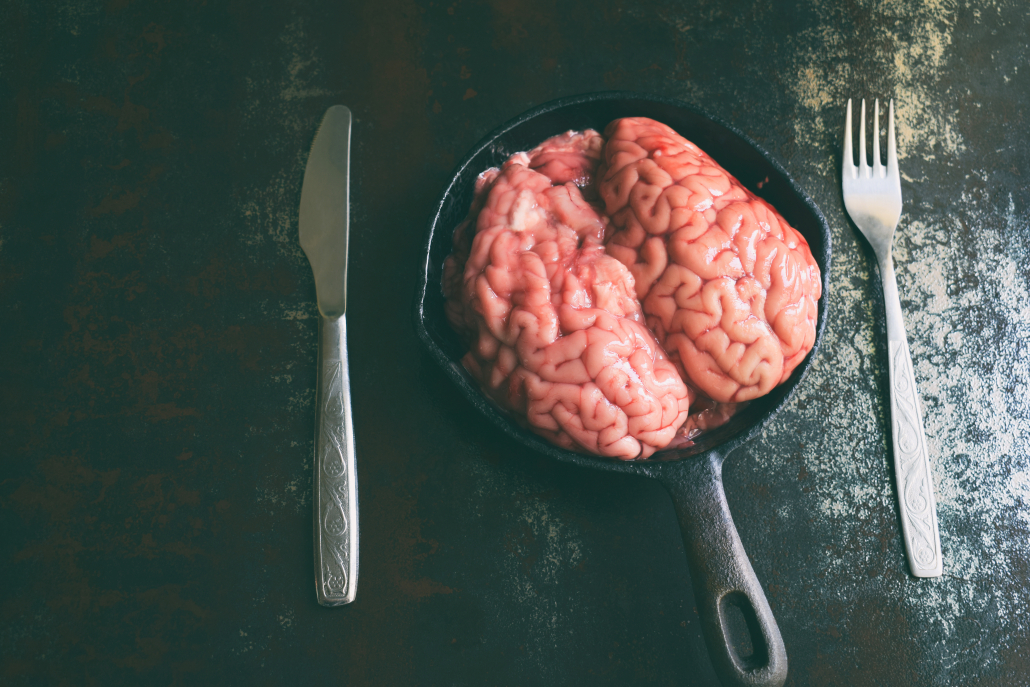We include products in articles we think are useful for our readers. If you buy products or services through links on our website, we may earn a small commission.
Beef Brain: Nutrition, Benefits, How to Eat it, and More

Liver, kidney, sweetbreads…think you’ve tried it all? If you haven’t tried beef brain, you could still be missing out.
We’ll be the first to admit that eating animal brains might not be your idea of fun. But beef brain is highly nutritious — and surprisingly tasty if done right!
It’s also far more popular than many people think–in fact, it’s a mainstay at most taco stands where it’s called sesos. It’s also a standard on menus ranging from South America to Morocco, and France.
Let’s explore the nutrition and health benefits of this highly nutritious yet overlooked organ meat, whether you consume it fresh or as a convenient organ meat supplement.
Table of Contents
What is Beef Brain?
As you might expect from its name, beef brain is simply the brain of a cow or calf. In the context of this article, we’re talking about beef brain as a food.
Eating brain might sound strange at first, but humans have been doing it for eons. Some archeologists believe that animal brain was among the first human foods.
With our stone weapons and tools, we would’ve been uniquely capable of accessing an animal’s nutrient-laden brain.
Beef Brain Nutrition
Like virtually every other organ meat, beef brain is simply loaded with nutrients. It shines the brightest in the fat-soluble nutrient department. Here are its nutrition facts.
Beef Brain: 100 grams
| Nutrient | Amount | % RDV |
| Calories | 141 calories | 5.6% |
| Total fat | 10.3 grams | 11% |
| Saturated fat | 2.3 grams | 2.3% |
| Cholesterol | 3,010 mg | 1,003% |
| Sodium | 126 mg | 5% |
| Potassium | 274 mg | 8% |
| Carbohydrates | 1.1 grams | 0% |
| Protein | 10.9 grams | 22% |
| Vitamin A | 160 IU | 3% |
| Vitamin D | 0 | 0% |
| Vitamin E | 2.1 mg | 11% |
| Vitamin K | 0.1 mcg | 0% |
| Folate | 6.3 mcg | 1.7% |
| Niacin | 4.2 mg | 6% |
| Riboflavin | 0.2 mg | 13% |
| Thiamine | 0.1 mg | 6% |
| Vitamin B6 | 0.1 mg | 11% |
| Vitamin B12 | 10.1 mg | 158% |
| Vitamin C | 10.5 mg | 18% |
| Calcium | 9.0 mg | 4% |
| Iron | 2.3 mg | 14% |
| Magnesium | 12.0 mg | 3% |
| Phosphorus | 335 mg | 36% |
| Zinc | 1.1 mg | 7% |
| Copper | 0.2 mg | 11% |
| Choline | 491 mg | 89% |
As you can see in the chart, beef brain is an especially rich source of choline, cholesterol, and DHA.
Choline
Choline is an essential nutrient that benefits our muscles, liver, and brain. Organ meats like beef brain are one of nature’s best sources of choline. Considering that most people on the standard American diet (SAD) are deficient in choline, beef brain may be effective in restoring choline levels.

DHA
DHA is one of the most essential of all the essential fatty acids. While most people think seafood when they think of the omega 3 fats, beef brain is also an excellent source of DHA. Just 100 grams of cooked beef brain contains over 700 milligrams of this essential fat. That’s around 200% of the RDA.
Studies show that DHA may offer anti-inflammatory properties while relieving stress, and promoting cognition and mood. DHA-rich foods like beef brain and salmon roe have been prized by pregnant women for millenia.
Research shows us why: a mother’s DHA intake may boost the critical thinking skills of her future children. .
Cholesterol
Beef brain is second only to pork brain when it comes to providing high-quality dietary cholesterol. 100 grams of brain contains ten times the cholesterol RDV.
Contrary to popular belief, cholesterol in our diets isn’t the health concern that it was previously believed to be. Our bodies produce — and use — large amounts of cholesterol in order to synthesize important hormones like pregnenolone and DHEA.
Adequate serum cholesterol levels are correlated with happiness and intelligence.
One study of otherwise healthy women found that those with substandard cholesterol levels were more likely to suffer from depression or other mental health problems.
Perhaps the most convincing evidence of cholesterol’s benefits is found in the Framingham heart study of 1948. This study found that people with ‘ideal’ cholesterol levels had lower “verbal fluency, attention/concentration, abstract reasoning, and a composite score measuring multiple cognitive domains” than those with ‘high’ cholesterol did. Cholesterol is even good for the skin.
Other Unique Nutrients
Beef brain contains several nutrients that the scientific community has only just begun to learn about. These nutrients include phosphatidylserine, sphingomyelin, brain cell activators, brain derived neurotrophic factor (BDNF), and other brain supporting peptides and factors.
These brain-specific nutrients also support the fascinating findings showing that each organ you consume may provide specific nutrients to the corresponding organs in your body!
Beef Brain Health Benefits
The unique nutrient profile of beef brain means that it may benefit various facets of your health. They make a great addition to your carnivore diet food list, and can be worked into standard diets.
In a perfect example of the like-supports-like concept behind nearly all organ meats, the nutrients and growth factors in beef brain means it may benefit your own brain’s health and processing speed.
Beef brain may support:
- Overall brain health
- Mood and well-being
- Long-term potentiation
- Working memory
- Neurogenesis
Beef brain may also benefit athletes and other fitness enthusiasts. Assuming one’s thyroid is healthy enough, the huge amounts of cholesterol it contains can be converted into large amounts of DHEA, progesterone, pregnenolone, and testosterone.
These “youth-associated hormones” can help your body keep its cortisol levels in check and adapt to the stressfulness of exercise.
Sourcing Quality Beef Brain
When it comes to beef brain, fresher is always better. Many of the most precious fats in beef brain are subject to degradation by sunlight and air.
Beef brain should also be sourced from younger cows to eliminate the risks of mad cow disease (bovine spongiform encephalopathy).
Mad cow and other prion diseases are extremely rare these days, and you can rest asure that they take long enough to develop that they’re virtually nonexistent in younger animals.
If you’re obtaining your beef brain via an encapsulated product, look for products that checks all the boxes:
- 3rd party testing for microbes
- 3rd party veterinarian inspection
- Freeze-dried to preserve nutrients
- Sourcing from young calves
- Organic certification
Doctor Kiltz’s multi-organ supplement is one of the only supplements on the market to offer quality New Zealand beef brain.
Cooking Beef Brain
Beef brain might not sound like food to many people in the West, but it’s highly regarded in other countries.
In Morocco the saying goes something like: “everything is good in a sheep and a calf.” In other words, nose-to-tail eating is the way to go.
So perhaps it’s only fitting that our beef brain recipe, El Mokh Mchermel, hails from the heart of Morocco. This dish’s marinade transforms beef brain into an approachable, genuinely tasty meal.
Moroccan Calf Brain (El Mokh Mchermel)
Prep time: 10 minutes
Cooking time: 30 minutes
Marinating time: 1 hour
Total time: 1 hour 40 minutes
Ingredients:
- 1 calf brain
- 1 cup water
- 1 tbsp vinegar/red wine
- 2 cloves garlic (grated)
- 3 tbsp chopped cilantro
- 2 tomatoes (optional)
- 1 tsp sweet paprika
- 1 tsp ground cumin
- 1/8 tsp cayenne
- 3 tbsp olive oil
- 1 teaspoon salt
Instructions
- Prepare the brain by covering it with boiling salt water for several minutes.
- Peel the outer transparent membrane off slowly.
- Trim off any coagulated blood or veins. Rinse thoroughly.
- Cut the brain into six pieces.
- Marinating the brain in a mixture of the above spices and water. Cover, then let sit in the fridge for 1 hour.
- Cook the brain in a pot over medium heat, adding water, oil, spices, and garlic.
- Add cilantro to the sauce after 15 minutes.
- Cover and turn the heat down to a simmer for 15 more minutes.
- Add your vinegar or red wine, then turn off the heat.
- Scoop out the brain, drizzle with extra olive oil, then serve.
Eating Animal Brains
Other animal brains can be eaten, too. Sheep and lamb’s brains are just as popular as beef brain in Morocco.
In France, eating veal brain is the go-to; in Mexico, brain is made into quesadillas and tacos. Some parts of the American South also routinely eat animal brains.
Regardless of which animal we’re talking about or how said animal’s brain is prepared, brains have similar nutritional characteristics. They’re predictably high in B vitamins, essential fatty acids, cholesterol, and phosphorus.
Addressing Concerns About Brain
The mainstream coverage of mad cow disease and other bovine-human prion diseases has scared some people away from eating beef brain.
Thankfully, mad cow disease is not a legitimate cause for concern. It’s not around anymore — and even if it was, it would only be a problem among older beef, not the young calves that brain is sourced from.
Beef Brain: The Takeaway
Beef brain is an often-overlooked yet extremely nutritious food.
Brain may not be on the top ten list of foods to bring to a potluck, but don’t let its eccentricity discourage you.
When prepared right, it’s more than just bearable (probably tastier than those mixed green salads you used to think were superfoods). If you haven’t already, consider adding beef brain to your keto/carnivore diet! For tips on how to create a well-formulated carnivore diet meal plan, click here.






















